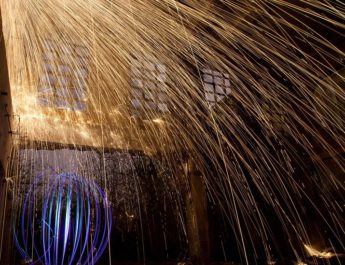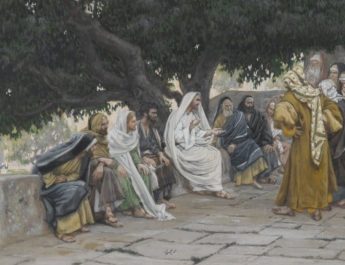Jeremiah 31:1-6
Easter A
1 At that time,A saysB the Lord,C I will beD the GodE
A “time” = et. Probably from anah (to answer, sing, announce); from ad (forever, all, old); from adah (to pass on, advance, decorate oneself). This is a period or season. It can also mean whenever or continually.
B “says” = neum. From na’am (to speak a prophecy; properly, to whisper, which implies saying an oracle). This is an utterance or speaking an oracle.
C “Lord” = YHVH. From havah (to be, become) or hayah (to come to pass, become, be). This is the name of the God of Israel, the self-existent and eternal one, the tetragrammaton. This pronunciation has been lost to time so “Lord” is generally used in its place.
D “be” = hayah. Related to “Lord” in v1. See note C above.
E “God” = Elohim.
of allF the familiesG of Israel,H and they shall be my people.I
F “all” = kol. From kalal (to complete). This is all or every.
G “families” = mishpachah. From the same as shiphcah (maid, maidservant); root means to spread out. This is one’s circle of relatives – clan, family, kindred.
H “Israel” = Yisrael. Related to “God” in v1. See note E above.
I “people” = am. From amam (to darken, hide, associate; creating shadows by huddling together). This is people or nation. It can be used specifically for a tribe, collectively of troops or armies, or figuratively to refer to a flock of animals.
2 Thus says the Lord:
The people who survivedJ the swordK
foundL graceM in the wilderness;N
J “survived” = sarid. From sarad (to escape or remain; properly, this refers to a puncture, so figuratively it is remaining or escaping by slipping out). This is survivor, remnant, or alive.
K “sword” = chereb. From charab (to attack, slay). This is any sharp instrument like a sword, dagger, axe, or mattock.
L “found” = matsa. This is to find, catch or acquire. It can also mean to come forth or appear. Figuratively, this can mean to meet or be together with.
M “grace” = chen. From chanan (beseech, show favor, be gracious; properly, to bend in kindness to someone with less status). This is grace, favor, kindness, beauty, precious.
N “wilderness” = midbar. From dabar (to speak, command, declare). This is mouth or speech. It can also be desert or wilderness. Additionally, it can be used for a pasture to which one drives cattle.
when Israel soughtO for rest,P
3 the Lord appearedQ to him from far away.R
O “sought” = halak. This is go, come, walk. It is walk literally and figuratively and includes people and animals. It can be used figuratively for one’s moral life – how we walk according to God’s way or against it. It can also refer to the walk of life as in the course one’s life takes, the choices we make, etc.
P “rest” = raga. 12x in OT. This is to toss violently, break, or disturb. It is tossed about as on rough sea or the skin breaking out in skin disease. It can also be to shut the eyes and so to settle, east, rest, or quiet.
Q “appeared” = raah. This is to see in a literal or figurative sense so stare, advise, think, view.
R “far away” = rachoq. From rachaq (to widen, become distant, cast, or remove in a literal or figurative sense). This is distant or far, whether of space or of time.
I have lovedS you with an everlastingT love;U
S “loved” = aheb. Related to “love” in v3. See note U below.
T “everlasting” = olam. This is a long scope of time whether in the past (antiquity, ancient time) or in the future (eternal, everlasting).
U “love” = ahabah. From ahab (love or affection); from aheb (to love, beloved, friend; to have affection for sexually or otherwise). This is love as a noun.
thereforeV I have continuedW my faithfulnessX to you.
V “therefore” = ken. Perhaps from kun (properly, in a perpendicular position; literally, to establish, fix, fasten, prepare; figuratively, it is certainty, to be firm, faithfulness, render sure or prosperous). This is to set upright. Generally used figuratively to mean thus, so, afterwards, rightly so.
W “continued” = mashak. This is to draw, drag, or pull. It can mean sow, march, remove, draw along, continue, extend, or prolong.
X “faithfulness” = chesed. From chasad (being good, kind, merciful; may mean bowing one’s neck as is done in the presence of an equal for courtesy’s sake; so, if one in a superior position is treating you like an equal, that is what is captured here). This is favor, goodness, kindness, loving kindness, pity, reproach, or a good deed. When done by God to humanity, this is mercy/loving kindness. When done by humanity to God, it is piety.
4 Again I will buildY you, and you shall be built,
O virginZ Israel!
Again you shall adornAA yourself with your tambourinesBB
Y “build” = banah. This is to build, make, set up, restore, repair, or obtain children. It is to build literally or figuratively.
Z “virgin” = betulah. This is virgin, maiden, or bride. Can also be used figuratively for a place.
AA “adorn” = adah. Related to “time” in v1. 10x in OT. See note A above.
BB “tambourines” = toph. 17x in OT. Perhaps from taphaph (to play a drum, timbrel, or tambourine). This is a timbrel or tambourine.
and go forthCC in the danceDD of the merrymakers.EE
CC “go forth” = yatsa. This is to go or come out, bring forth, appear. It is to go out in a literal or figurative sense.
DD “dance” = machol. 6x in OT. From chul (whirling around so dancing as in a circle or writhing in pain; used particularly for the pain of childbirth or from writhing due to fear; can also be falling in pain or waiting). This is a round dance.
EE “merrymakers” = sachaq. This is to laugh, celebrate, joke, mock, scorn. This is laughing, whether for joy or scorn. It can imply plays or holding a contest.
5 Again you shall plantFF vineyardsGG
on the mountainsHH of Samaria;II
the planters shall plant
and shall enjoy the fruit.JJ
FF “plant” = nata. To fix or fasten, establish or plant. This is planting in a literal or figurative sense.
GG “vineyards” = kerem. This is a vineyard, garden, vines, or a vintage.
HH “mountains” = har. From harar (hill or mountain). This is mountain, hill, hilly region.
II “Samaria” = Shomron. From shamar (to keep, watch, or preserve; to guard something or to protect it as a thorny hedge protects something). This is Samaria, meaning watch station.
JJ “enjoy the fruit” = chalal. This is to pierce, which implies to wound. It is used figuratively for making someone or something profane or breaking your word. It can also mean to begin as though one opened a wedge. Also, to eat something as a common thing.
6 For there shall beKK a dayLL when sentinelsMM will callNN
in the hill countryOO of Ephraim:PP
KK “be” = yesh. This is being, existence, or substance.
LL “day” = yom. Root may mean being hot. This is the day in a literal or figurative sense. It can also mean birth, age, daylight, continually or other references to time.
MM “sentinels” = natsar. This is to watch, guard, protect. It can be positive – preserve or obey. It can be negative as conceal.
NN “call” = qara. This is to call or call out – to call someone by name. Also used more broadly for calling forth.
OO “hill country” = har. Same as “mountains” in v5. See note HH above.
PP “Ephraim” = Ephrayim. From the same as epher (ashes or dust – properly something strewn) OR from parah (to grow, increase, be fruitful in a literal or figurative sense). This is Ephraim, one of Joseph’s sons, his descendants, and their land.
“Come,QQ let us go upRR to Zion,SS
to the Lord our God.”
QQ “come” = qum. To arise, stand, accomplish, establish, abide. This is rising as in rising against, getting up after being sick or asleep, arising from one state to another, becoming powerful, or rising for action. It can also be standing in a figurative sense.
RR “go up” = alah. This is to go up, approach, ascend, be high, be a priority; to arise in a literal or figurative sense.
SS “Zion” = Tsiyyon. Related to tsyiyyun (signpost, monument); from tsavah (to charge someone, to command, order); from the same as tsiyyah (dryness, drought); from a root meaning parched as desert, dry land. Zion can refer to a mountain in Jerusalem as well as another name for Jerusalem itself or the people.
Image credit: “Chat in the Rain” by Margret Hofheinz-Döring, 1963.




